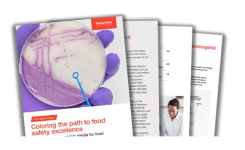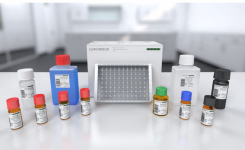Capturing E. coli for Faster Detection
go back to news archives| |
| With the rapid isolation and identification of verocytotoxigenic strains of Escherichia coli a high priority, Lab M's Captivate™ immunomagnetic separation (IMS) technique allows part of the conventional enrichment to be omitted, helping labs achieve faster results. For more information visit www.labm.comCaptivate™ uses antibody-coated microscopic paramagnetic particles for the specific immunomagnetic separation of micro-organisms. The beads have a magnetite core and a ceramic zirconium oxide coating and are designed for the immunomagnetic separation of target bacteria from enrichment cultures. When incubated with a sample, the antibody-coated beads bind to cell surface antigens forming an antibody-antigen complex between the beads and the target molecules. Target cells are 'captured' and are then separated from background organisms and interfering materials using a magnetic concentrator. Non-specifically bound material is removed by washing and beads are then plated to selective media or subjected to other analyses. Analagous to selective enrichment, IMS offers greater speed and can be a less damaging alternative to the use of antibiotics and other harsh reagents. It is highly effective in enhancing the isolation rates of target organisms, even from potentially problematic samples. IMS is often also used in conjunction with other technologies, such as PCR, and can also provide the 'capture' front end for automated rapid-detection systems. |
NOTE: This item is from our 'historic' database and
may contain information which is not up to date.
Source : Lab M View Company Information
Posted on June 20, 2011
LATEST MICROBIOLOGY NEWS
-
AOAC Validated iQ-Check Vibrio PCR Kit
01 Apr 2025 -
AI-Powered Precision For Colony Counting
27 Mar 2025
MICROBIOLOGY EVENTS
-
Mycotoxin Detection and Analysis: Strategies to Support Your Testing Program
3 Apr 2025 -
15th Conference of The World Mycotoxin Forum® – WMFmeetsSalzburg
7 Apr 2025 -
ESCMID European Congress of Clinical Microbiology and Infectious Diseases
11 Apr 2025 -
IBQC 2025
14 Apr 2025 -
IFU Technical Workshop 2025
15 Apr 2025 -
Validation of Water Systems for Microbial Control
23 Apr 2025 -
USP Chapter <86> and the Move to Recombinant Methods
29 Apr 2025 -
Free Expert Webinar: Advancing Drinking Water Microbiology Testing Compliance & Efficiency
29 Apr 2025 -
British Society For Microbial Technology 40th Anniversary Microbiology Conference
15 May 2025 -
Sampling and Microbial Testing of Water and Data Trending
20 May 2025
















